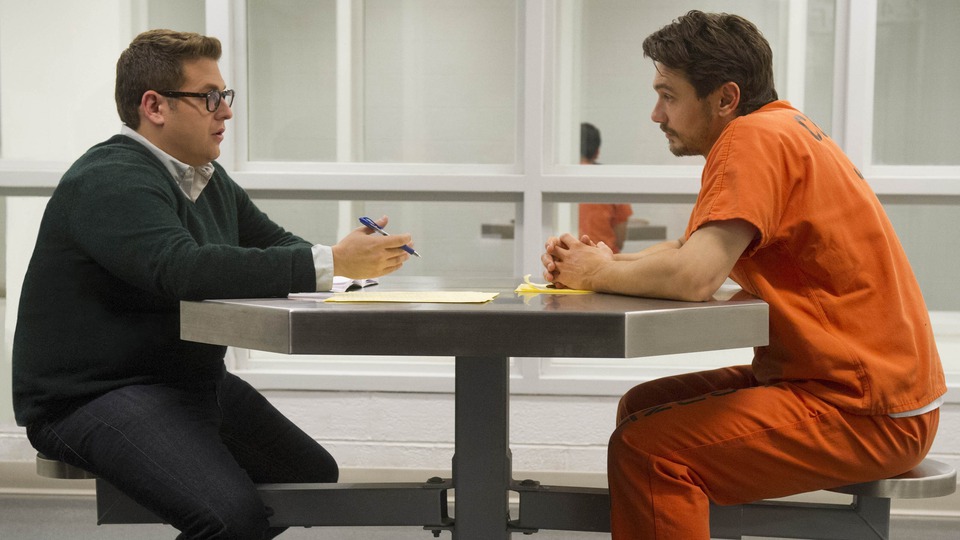In True Story, the type of drama for which the expression “stranger than fiction” was coined, James Franco finds a creepy new application for his signature sleepiness, that narcotized daze he usually reserves for stoner comedies and award-show appearances. Franco plays Christian Longo, an “intelligent and sane man” arrested, in December of 2001, for the suspected murder of his wife and three young children, all of who were found floating in the shallow waters of an Oregon slough. Awaiting trial behind bars, Longo didn’t confess to the heinous crime, but he didn’t express much grief about it either, and Franco—clad in a bright orange jumpsuit, his limbs in chains—wears the man’s eerie calm like a mask of false civility. The actor never raises his voice, only an eyebrow or two. Skin nevertheless crawls.
It’s unnerving to see the star of Pineapple Express play his heavy-lidded stupor for basically the opposite of laughs. And the disorientation is only enhanced by the sight of Jonah Hill, Franco’s on and offscreen buddy, doing his own straight-faced routine across the table from him. Relying less than ever before on his comedic chops, Hill has been cast as Michael Finkel, the disgraced New York Times reporter who became Longo’s unlikely confidante. The two met after Finkel discovered that Longo, then in custody, had used his name as an alias while laying low in Mexico. The journalist was doing some low-laying of his own, having recently lost his job after fudging crucial facts in a cover story about child slavery in Africa. Smelling a big scoop—and maybe a shot at professional redemption—Finkel arranged a meeting with the accused, which turned into a regular correspondence. Did Longo do the deed? And if so, what game was he playing by submitting himself to close scrutiny?
True Story, adapted from Finkel’s memoir of the same name, chronicles the unusual bond these two pariahs forged, touching on the notoriety that linked them and the moral dilemma that grew out of their conversations. The first feature from Rupert Goold, artistic director of London’s Almeida Theatre, the film owes a dramatic and stylistic debt to Capote, another stage veteran’s big-screen debut about the complicated relationship between a prisoner facing a murder rap and the writer looking to capitalize on his experiences. (There’s certainly a touch of Bennett Miller in scenes of Hill trekking through the snowy woods of upstate New York, standing in here for Montana.) But True Story also fits—neatly if by happy accident—into the current true-crime craze. Like Serial and The Jinx, it draws some fascination from the distinct possibility that the suspect it studies may be guilty as charged.
Of course, in this case, the answers are just a Google search away. Counting on his audience going in blind, Goold builds his dramatization around the all-but-solved mystery of what really happened to Longo’s family. Stylized flashbacks, including one of a pint-sized body being dumped and discovered, carefully obscure the pertinent details. The goal is a “satisfying” arc: True Story, true to its source material, adopts Finkel’s blinkered perspective; we’re meant to share his shifting opinion of Longo. Fittingly, perhaps, the movie also bends the truth to fit its storytelling needs, in ways not so different than the ones that got Finkel fired. Interactions that occurred by letter take on the new form of in-person confrontations. Did Finkel’s wife (an overqualified Felicity Jones) really visit Longo in prison to deliver a scathing coup de grâce? Did Longo really turn and wink at Finkel in court, as Franco does to Hill during the obligatory trial scene?
True Story isn’t a documentary or a news piece, so its dramatic liberties and strategic withholding of info are permissible. As a portrait of modern journalism, though, it leaves quite a lot to be desired; this is the kind of film that has characters trade grandiose talking points about the ethics of reporting, but can’t be bothered to show its reporter hero—still recovering from the damage factual inaccuracies did to his career—using a recording device during interviews. The meat of the movie is the behind-bars rendezvous between Finkel and Longo, whose interactions raise questions of journalistic responsibility and the banality of evil. But when a closing block of text announces that the two men still talk on a semi-regular basis—a surprise, given the finality of their last on-screen meeting—it’s hard to shake the feeling that a truly complex liaison has been reduced to an acting exercise for a couple of moonlighting funnymen. Neither cracks a smile, which is its own kind of victory, but nor do they crack the code of these “characters,” two men united by circumstances that look, in movie form, not so stranger than fiction after all.











